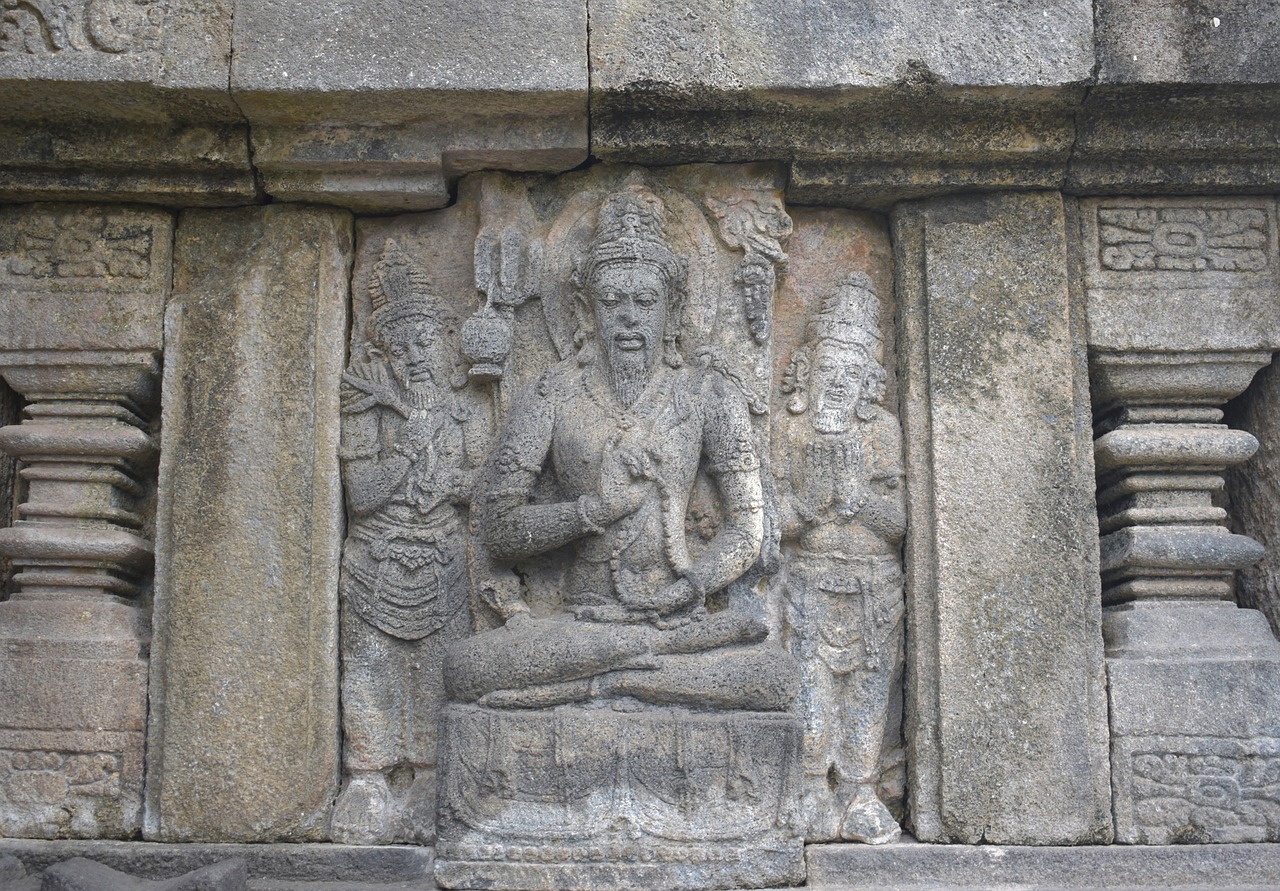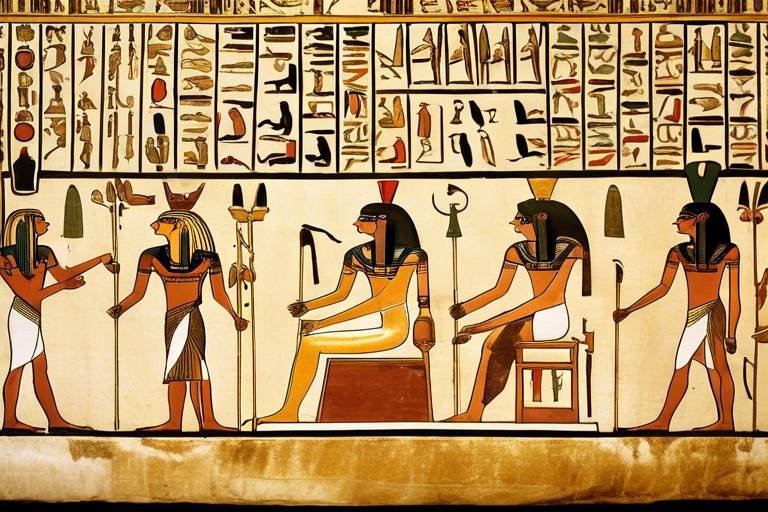How Ancient Religions Addressed Human Suffering
Ancient religions have long grappled with the profound question of human suffering, seeking to provide solace, understanding, and guidance in the face of life's challenges. Each ancient belief system offers a unique perspective on the nature of suffering and the ways in which individuals can navigate and transcend it. From Buddhism's profound insights on the nature of suffering to Christianity's teachings on compassion and redemption, these ancient religions have left a lasting legacy on how we perceive and address human suffering.
In Buddhism, suffering is considered a fundamental aspect of human existence, known as dukkha. The Four Noble Truths and the Noble Eightfold Path provide a roadmap for followers to understand the nature of suffering and how to overcome it. By embracing concepts like mindfulness, compassion, and non-attachment, Buddhists aim to alleviate suffering and achieve inner peace.
Hinduism, on the other hand, sees suffering through the lens of karma and reincarnation. The belief in the cycle of birth, death, and rebirth shapes how Hindus interpret the challenges they face in life. By living in accordance with dharma and seeking spiritual growth, individuals aim to break free from the cycle of suffering and attain liberation.
Judaism acknowledges the reality of human suffering and offers a framework for finding meaning and hope in difficult times. Concepts like tikkun olam, the idea of repairing the world through acts of kindness and justice, underscore the importance of community support and ethical living in addressing suffering.
Christianity views suffering as part of the human condition, but also emphasizes the transformative power of love, forgiveness, and faith. The teachings of Jesus Christ on compassion, redemption, and the promise of eternal life provide comfort and guidance to believers facing adversity.
Islam sees suffering as a test of faith and an opportunity for spiritual growth. The concept of sabr, or patience, is central to how Muslims navigate challenges and find strength in their relationship with Allah. By surrendering to the divine will and seeking solace in prayer, followers of Islam strive to find peace amidst suffering.
Taoism approaches human suffering by advocating for harmony with the natural order and the cultivation of inner balance. Practices like meditation, simplicity, and living in accordance with the Tao aim to help individuals find peace and acceptance in the midst of life's trials.
Confucianism, with its emphasis on social harmony and ethical conduct, provides a moral compass for addressing human suffering. The teachings of Confucius on benevolence, righteousness, and filial piety guide individuals in navigating challenges and cultivating a more harmonious society.
Native American spirituality offers a holistic view of human suffering, highlighting the interconnectedness of individuals, communities, and the natural world. Through rituals, ceremonies, and storytelling, indigenous traditions seek to heal wounds and restore balance, fostering resilience and unity in the face of adversity.

Buddhism
Buddhism, originating from the teachings of Siddhartha Gautama, commonly known as the Buddha, delves deeply into the nature of human suffering. Central to Buddhist philosophy is the concept of dukkha, which encompasses the idea that suffering is an inherent part of human existence. The Four Noble Truths are foundational in addressing suffering, outlining the reality of suffering, its origins, cessation, and the path to liberation from suffering.
At the core of Buddhist teachings is the Noble Eightfold Path, a guide to living a life free from suffering. This path includes principles such as right understanding, intention, speech, action, livelihood, effort, mindfulness, and concentration. By following these principles, individuals can cultivate wisdom, ethical conduct, and mental discipline to navigate the challenges of life.
Buddhism encourages practitioners to develop mindfulness through practices like meditation, which helps in understanding the impermanent and interconnected nature of existence. By cultivating awareness and compassion, individuals can transcend personal suffering and contribute to the well-being of others, fostering a sense of interconnectedness and empathy.

Hinduism
In Hinduism, the concept of karma plays a central role in understanding human suffering. Karma, the law of cause and effect, dictates that actions in past lives influence one's current circumstances, including the experience of suffering. Hindus believe in the cycle of reincarnation, where the soul undergoes multiple births to learn and evolve. This belief shapes their perspective on suffering as a necessary part of the soul's journey towards spiritual growth and enlightenment.
Furthermore, Hinduism teaches that individuals have the power to create positive karma through righteous actions, selfless service, and devotion to God. By aligning one's thoughts and deeds with dharma, the moral and ethical duties prescribed by Hindu scriptures, individuals can mitigate the effects of negative karma and alleviate their suffering. The concept of dharma guides Hindus in leading a virtuous life and cultivating inner peace amidst life's challenges.

Judaism
Judaism, one of the oldest monotheistic religions, approaches the issue of human suffering with a blend of realism and hope. Central to Jewish teachings is the acknowledgment of the existence of suffering in the world. The concept of 'tikkun olam,' meaning 'repairing the world,' underscores the responsibility of individuals to actively engage in acts of kindness, justice, and compassion to alleviate suffering and bring about positive change. This principle emphasizes the interconnectedness of humanity and the importance of collective efforts in addressing societal challenges.
Furthermore, Judaism places a strong emphasis on the significance of community support in times of adversity. The idea of coming together as a community to offer comfort, assistance, and solidarity to those experiencing suffering is deeply rooted in Jewish tradition. By fostering a sense of belonging and shared responsibility, Jewish communities create a supportive environment where individuals can find solace and strength amidst trials and tribulations.
Moreover, the belief in the covenant between God and the Jewish people plays a crucial role in how suffering is perceived and interpreted within Judaism. The faith in a divine plan and the promise of redemption provide a source of comfort and resilience for individuals facing hardship. By trusting in God's wisdom and guidance, adherents find solace in the belief that their suffering is not in vain and that there is a greater purpose beyond their immediate struggles.

Christianity
Christianity, one of the world's major religions, offers a unique perspective on human suffering. Central to Christian belief is the idea that suffering is an inherent part of the human experience, stemming from the original sin of Adam and Eve. However, Christianity also provides a message of hope and redemption through the teachings of Jesus Christ. His life, death, and resurrection are seen as a divine sacrifice to atone for the sins of humanity, offering believers the promise of salvation and eternal life.
The core values of Christianity, such as compassion, forgiveness, and love, play a crucial role in how followers approach and navigate suffering. The teachings of Jesus emphasize the importance of caring for others, showing kindness, and extending forgiveness even in the face of adversity. By emulating Christ's example, Christians strive to alleviate the suffering of those around them and find solace in their faith.
Prayer and worship are integral practices in Christianity that provide comfort and strength in times of distress. Believers are encouraged to turn to God in prayer, seeking guidance, peace, and understanding amidst trials and tribulations. The community aspect of Christian fellowship also plays a significant role in supporting individuals through difficult times, offering a sense of belonging and solidarity.
Moreover, the concept of divine providence in Christianity underscores the belief that God has a plan for every individual, even in the midst of suffering. Trusting in God's sovereignty and ultimate goodness allows Christians to find meaning and purpose in their struggles, viewing them as opportunities for spiritual growth and deeper faith.
Overall, Christianity's approach to human suffering is characterized by a combination of acknowledging the reality of pain and hardship while holding onto the hope and assurance of God's love and grace. Through compassion, faith, and a steadfast belief in the redemptive power of Christ, Christians find strength to endure suffering and strive towards a greater understanding of God's purpose in their lives.

Islam
Islam approaches human suffering as a test of faith and a means of spiritual growth. Muslims believe that challenges and hardships are opportunities to demonstrate patience (sabr) and trust in Allah's wisdom and mercy. The Quran, the holy book of Islam, provides guidance on how to navigate suffering with resilience and faith. It teaches that trials are temporary and can lead to greater spiritual rewards in the hereafter.

Taoism
Taoism, an ancient Chinese philosophy and spiritual tradition, offers a unique perspective on human suffering. Central to Taoist teachings is the concept of harmony with the natural order, known as the Tao. Taoists believe that suffering arises from resisting or going against the flow of life, and that true peace and contentment can be found by embracing the natural rhythms of existence.
One of the key principles in Taoism is the importance of acceptance and simplicity in navigating life's challenges. By letting go of attachments and desires, individuals can cultivate a sense of inner peace and harmony. Taoist practices such as meditation, qigong, and tai chi are aimed at aligning the body, mind, and spirit with the flow of the Tao, promoting balance and well-being.
In Taoist philosophy, the concept of yin and yang symbolizes the dualistic nature of existence, where opposing forces are interdependent and interconnected. This understanding encourages individuals to embrace both the light and the dark aspects of life, recognizing that hardships and struggles are essential for personal growth and transformation.
Living in accordance with Taoist principles involves simplicity, humility, and living in harmony with nature. By attuning oneself to the natural world and cultivating a sense of interconnectedness with all beings, Taoists seek to find peace and fulfillment in the midst of life's uncertainties and challenges.

Confucianism
Confucianism, a philosophical and ethical system founded by Confucius in ancient China, offers valuable insights into addressing human suffering. Central to Confucian teachings is the emphasis on social harmony and ethical conduct as essential components in alleviating the challenges of suffering. Confucius believed in the importance of cultivating virtues such as benevolence, righteousness, and filial piety to create a harmonious society where individuals support and care for one another.
Within the framework of Confucianism, the concept of ren, often translated as "benevolence" or "humanity," plays a crucial role in addressing human suffering. By practicing compassion and kindness towards others, individuals can contribute to the well-being of society and reduce the impact of suffering on both a personal and communal level. The idea of ren encourages individuals to prioritize the welfare of others and cultivate a sense of empathy and understanding in their interactions.
Furthermore, Confucianism emphasizes the importance of ethical behavior in navigating the complexities of human suffering. The teachings of Confucius advocate for the practice of righteousness, integrity, and moral rectitude as guiding principles in addressing challenges and hardships. By upholding moral values and ethical standards, individuals can navigate difficult situations with dignity and integrity, fostering a sense of inner peace and resilience in the face of adversity.
Confucianism also underscores the significance of filial piety, the respect and devotion shown towards one's parents and ancestors. This concept extends beyond familial relationships to encompass a broader sense of reverence for elders and authority figures in society. By honoring and upholding the values of filial piety, individuals can cultivate a sense of connectedness and continuity with the past, present, and future generations, providing a source of strength and support in times of suffering.
In essence, Confucianism offers a moral and philosophical framework that encourages individuals to cultivate virtues, practice ethical behavior, and foster harmonious relationships as a means of addressing human suffering. By embracing the teachings of Confucius and embodying the values of benevolence, righteousness, and filial piety, individuals can navigate the challenges of suffering with grace, compassion, and resilience.

Native American Spirituality
Native American spirituality is deeply rooted in the interconnectedness of all living beings and the natural world. It embraces the belief that human suffering is intricately linked to the balance and harmony within individuals, communities, and the environment. Central to Native American traditions are rituals and ceremonies that seek to restore this balance and address suffering through spiritual practices.
Storytelling plays a significant role in Native American spirituality, serving as a means of passing down wisdom, cultural values, and healing practices from one generation to another. Through oral traditions, myths, and legends, indigenous communities find solace, guidance, and strength in navigating the challenges of human suffering.
The concept of the Medicine Wheel, a sacred symbol representing the interconnectedness of all aspects of life, guides Native American spiritual practices in addressing suffering. This symbolic framework encompasses the physical, emotional, mental, and spiritual dimensions of existence, offering a holistic approach to healing and finding balance in the face of adversity.
Frequently Asked Questions
- What is the significance of the Four Noble Truths in Buddhism?
The Four Noble Truths in Buddhism are foundational teachings that address the nature of suffering (dukkha), its origin, cessation, and the path to liberation from suffering. They provide a framework for understanding the human experience and offer guidance on how to transcend suffering.
- How does Hinduism explain the concept of karma in relation to human suffering?
In Hinduism, karma is the law of cause and effect, where one's actions have consequences that affect their present and future experiences. The concept of karma is central to understanding why individuals may face suffering or joy in their lives based on their past actions and intentions.
- What role does community support play in addressing suffering in Judaism?
Community support is integral in Judaism for providing comfort, solidarity, and practical assistance to individuals facing challenges and suffering. The concept of tikkun olam, or repairing the world, emphasizes the collective responsibility to alleviate suffering and promote healing within the community.
- How does Christianity offer comfort to individuals experiencing suffering?
Christianity provides comfort to those suffering through the teachings of Jesus Christ, emphasizing love, compassion, forgiveness, and the promise of eternal life. Believers find solace in the belief that their suffering is part of a greater plan and that through faith and compassion, they can find strength and redemption.
- What is the significance of patience (sabr) in Islam's approach to suffering?
In Islam, patience (sabr) is considered a virtue that helps believers endure trials and tribulations with resilience and faith. By practicing patience and relying on Allah's guidance, Muslims find inner strength and spiritual growth in the face of adversity and suffering.
- How does Taoism promote finding peace amidst life's challenges?
Taoism encourages individuals to seek harmony with the natural order, embrace simplicity, and cultivate balance through practices like meditation and living in accordance with the Tao. By aligning with the flow of life and accepting the ups and downs, followers of Taoism find peace amidst the challenges of existence.
- What moral framework does Confucianism offer for addressing suffering in society?
Confucianism emphasizes ethical conduct, social harmony, and the importance of benevolence, righteousness, and filial piety in navigating and alleviating suffering in society. The teachings of Confucius provide a moral compass for individuals to cultivate virtuous behavior and contribute to a more harmonious community.
- How do rituals and storytelling contribute to healing in Native American spirituality?
In Native American spirituality, rituals, ceremonies, and storytelling are essential components for addressing and healing human suffering. Through these practices, individuals connect with their cultural heritage, the natural world, and their community, fostering resilience, healing, and a sense of interconnectedness.



















